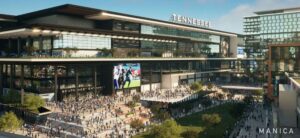From tennesseetitans.com
The Tennessee Titans have received final approval from the Metropolitan Nashville Council to move forward with plans to build a new, enclosed stadium set on Nashville’s East Bank.
Metro Nashville Council issued the final approval on Wednesday, April 26, in a vote of 26-12. The Metro Nashville Sports Authority, the owner and landlord of both the current and new stadium, unanimously approved the stadium agreement on April 4.
“For more than 25 years, Nashville, Tennessee, has been the Titans’ home, and with the approval of the  new stadium agreement, we are grateful to know the Titans will be a part of this great city and state for decades to come,” said Titans controlling owner Amy Adams Strunk. “I remember the early days of our time here feeling all the promise and opportunity ahead, and I feel that same enthusiasm and excitement again today. We are thankful for the support of Mayor Cooper, Metro Council, the Sports Authority, the State of Tennessee, and most importantly, the people of Nashville and Tennessee as we all embark on this new chapter together.”
new stadium agreement, we are grateful to know the Titans will be a part of this great city and state for decades to come,” said Titans controlling owner Amy Adams Strunk. “I remember the early days of our time here feeling all the promise and opportunity ahead, and I feel that same enthusiasm and excitement again today. We are thankful for the support of Mayor Cooper, Metro Council, the Sports Authority, the State of Tennessee, and most importantly, the people of Nashville and Tennessee as we all embark on this new chapter together.”
The stadium agreement includes a new 30-year lease and non-relocation agreement between the Titans and the Sports Authority. The terms of the new agreement remove the current obligation of Nashville’s General Fund to maintain and upgrade the stadium and returns 66 acres of land to the City of Nashville previously restricted by parking lots through 2039. The City has announced plans to include the returned property in the creation of a new neighborhood set along Nashville’s Cumberland River. The neighborhood, through new revenue sources generated by its development, is projected to bring in over a billion dollars to Nashville’s General Fund over its first 30 years of development.
The team will also contribute nearly $48 million over the life of the lease to the Nashville Needs Impact Fund, a fund directed by the Metro Council to support city needs such as public education, public transit, affordable housing, and several other areas.
“Tonight is a huge win for Nashville taxpayers,” said Nashville Mayor John Cooper. “We’ve eliminated a billion-dollar liability created by an aging stadium lease and created a platform for the city to thrive for decades. This was always about more than football. This vote unlocks the East Bank Vision for Nashville’s next generation. It enables a true smart growth plan for the decades ahead. It will expand our transit network, create affordable housing, build parks and civic space, activate the waterfront, and drive resilience and sustainability.
Mayor Cooper continued: “It allows us to build a transformational north-south boulevard. From neighborhoods across the city, this plan will cut commute times by getting cars off the interstate for intracity trips. It will allow frequent, fast, affordable bus service with dedicated lanes connecting residents to jobs and new opportunities. This is how a city effectively manages growth. It creates a bright future for Nashville, and I’m grateful for Metro Council’s support and confidence in this plan.”
The stadium is currently estimated at 1.75 million square feet, with a capacity of approximately 60,000. It is anticipated to bring in year-round events, with aspirations to host Super Bowls, NCAA Final Fours, College Football Playoffs, Wrestlemanias, and more. It will also continue to host Tennessee State University home football games, extending the long-standing partnership between TSU and the Titans. The stadium will include a 12,000 square foot community space to host classes for local schools, job trainings, and other community-minded events.
Groundbreaking is expected to occur in early-to-mid 2024, with an opening anticipated in 2027. It will set a goal of achieving a U.S. Green Building Council LEED Gold certification. Titans games and other major events will continue to operate in the current Nissan Stadium until the new building opens.
“Today marks a huge milestone for both the Tennessee Titans organization and the City of Nashville as we move forward with plans for a new stadium,” said Titans President and CEO, Burke Nihill. “We are extremely excited about this building’s ability to host the world’s best and greatest events, but this agreement is about so much more than a stadium. This is a generational opportunity to address our city’s priorities and ensure its health and vitality for the next 30 years. Our city and our state have bright futures ahead, and we’re humbled by the opportunity to continue to be a part of it.”
The Titans are responsible for $840 million of stadium funding and any cost overruns. $500 million will come from a contribution from the State of Tennessee. The remaining $760 million of the $2.1 billion budget will come from revenue bonds issued by the Metro Sports Authority to be repaid through a one-percent increase in Davidson County’s hotel occupancy tax, in-stadium sales tax, 50 percent of sales tax from future development of the stadium’s campus, rent paid by the team, and a pre-existing ticket tax of three dollars per ticket sold that will carry over to the new building. The stadium budget includes stadium-related infrastructure required to open the building.
